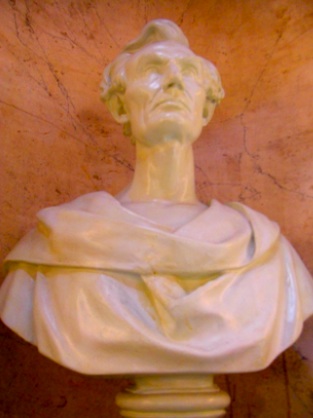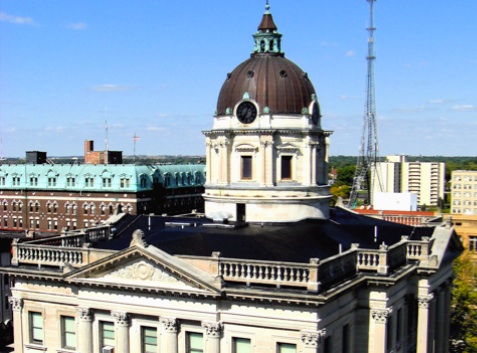
Generally, when he was speakin', he was cool and quiet and things all fit together, and when you come away you was calm - but your head was workin'; but that time up to Bloomington he was like - what's that the Bible calls it? - avengin fire" - yes, sir, that's it, he was like avengin fire." Ronald W. Diller
On this day, Abraham Lincoln's 200th birthday, I have to confess to catching Lincoln fever. It was bound to happen considering that after Katrina we ended up living next to the office where Lincoln was talked into running for President. Our front window looks out over the courthouse where he honed his oratory skills, and over the last few years I've gotten used to Lincoln reenactors in top hats strolling the block.
I'm still hoping to come across Lincoln's Lost Speech delivered here in Bloomington, but it remains unrecorded despite a room full of reporters present at the time. It was described by witnesses as so impassioned that Lincoln was jumping tables shouting that the union would be preserved. One said:
"I never knew exactly what did happen there. All I recollect is that at the beginnin' of that speech I was settin in the back of the room and when I come to I was hanging' on to the front of the platform. I recollect I looked up and seen Joe Medill [Chicago publisher] standin on the reporters' table lookin foolish-like and heard him say, "Good Lord, boys! I ain't took a note!" - Ronald W. Diller quoted in Lincoln's Lost Speech by Elwell Crissey
 Bloomington was the occasional home of a young Lincoln becoming so progressive he no longer felt at home in the Whig party and developed a new one. It's still easy to get a feel for Lincoln's evolution as a circuit lawyer riding through the tree-lined neighborhoods of this sleepy town. His friend and eventual campaign manager Jesse Fell was to become famous for planting hundreds of trees here and founding the local college, as well as being the grandfather of Adlai Stevenson. In the state capital it's still possible to find tales passed down about Mary Todd Lincoln's parenting, notable at the time because the Lincoln boys were allowed to be, shall we say, more rambunctious than the average child of the nineteenth century.
Bloomington was the occasional home of a young Lincoln becoming so progressive he no longer felt at home in the Whig party and developed a new one. It's still easy to get a feel for Lincoln's evolution as a circuit lawyer riding through the tree-lined neighborhoods of this sleepy town. His friend and eventual campaign manager Jesse Fell was to become famous for planting hundreds of trees here and founding the local college, as well as being the grandfather of Adlai Stevenson. In the state capital it's still possible to find tales passed down about Mary Todd Lincoln's parenting, notable at the time because the Lincoln boys were allowed to be, shall we say, more rambunctious than the average child of the nineteenth century.
Lincoln's Midwestern lost speech showed that both parents contributed to this fiery nature.
He knew what he was doing' that night. He knew he was cuttin' loose. He knew them old Whigs was goin' to have it in for him for doin' it, and he meant to show 'em he didn't care a red cent what they thought. He knew there was always a lot of fools in that new party he was joining - the kind that's always takin' up with every new thing comes along to get something to orate about. He saw clear as day that if they got started right that night, he'd got to fire 'em up, so he threw back his shoulders and lit in," recalled Diller, the local druggist and an eyewitness to the speech.
Bloomington was on Lincoln's court circuit, and they have plaques all over town to prove it. One day Lincoln's friend Fell saw him walking out of the courthouse and invited the young attorney into his brother's office to request an autobiography. Fell had been hearing the excitement out East over the Lincoln/Douglas debates. Lincoln declined for a year and when he changed his mind asked that, "If any thing be made out of it, I wish it to be modest." As to the note's briefness, 'There is not much of it, because there is not much of me."
An eyewitness to the Lost Speech, John Wentworth of the Chicago Democrat wrote, "I shall not mar any of its fine proportions by attempting even a synopsis of it." The press was either too enthralled to write, or publishers censored the fiery anti-slavery rhetoric. Bloomington author and Illinois Supreme Court Reporter Isaac Newton Phillips in 1901 discounted a version written decades after the fact with: "We do not know what he said."
But we do know how he said it.
His speech was full of fire and energy and force. It was logic; it was pathos; it was enthusiasm; it was justice, equity, truth, and right set ablaze by the devine fires of a soul maddened by the wrong; it was hard, heavy, knotty, gnarly, backed with wrath," said his law partner William Herndon who also described it as the best speech of Lincoln's career.
This was table-jumping, string bean Lincoln. All cheekbones because he had not yet taken an 11-year old's advice to grow a beard to lend him gravitas. She was possibly the first campaign image consultant. The Lost Speech did not survive to be dissected. Even if it had, our first courthouse burned to the ground at the turn of the century, much of the Lincoln lore burning with it. I stop in once in awhile to ask for a copy of the Lost Speech, just in case one has turned up.
The speech probably was not religious. Upon finding out most of Springfield's ministers polled against his candidacy Lincoln wrote:
"I am not a Christian -- God knows I would be one but I have carefully read the Bible, and I do not understand this book. These men well know that I am for freedom in the territories, freedom everywhere as far as the Constitution and the laws will permit, and that my opponents are for slavery. They know this, and yet, with this book in their hands, in the light of which human bondage cannot live a moment, they are going to vote against me. I do not understand it at all."
What Lincoln saw in New Orleans on his first flatboat trip south influenced him deeply and he wrote to an old friend, "How can any one who abhors the oppression of negroes, be in favor or degrading classes of white people? Our progress in degeneracy appears to me to be pretty rapid. As a nation, we began by declaring that "all men are created equal." We now practically read it "all men are created equal, except negroes."
"When the Know-Nothings get control, it will read "all men are created equal, except negroes, and foreigners, and Catholics." When it comes to this I should prefer emigrating to some country where they make no pretence of loving liberty -- to Russia, for instance, where despotism can be taken pure, and without the base alloy of hypocracy," Lincoln's letter concluded. With letters like this written around the time of the famous lost speech, it's easy to imagine the direction it took.
In ten minutes he was about eight feet tall; his face was white, his eyes was blazin' fire, and he was thunderin, 'Kansas shall be free!' 'Ballots, not bullets!' 'We won't go out of the Union and you shan't.'" Diller described. The Union line is the only part of the speech universally agreed upon by eyewitnesses. "Generally, when he was speakin', he was cool and quiet and things all fit together, and when you come away you was calm - but your head was workin'; but that time up to Bloomington he was like - what's that the Bible calls it? - avengin fire" - yes, sir, that's it, he was like avengin fire," Diller said.
I like to think that the Abraham Lincoln of the Lost Speech is the one President Barack Obama will be paying tribute to in Springfield today. The Lincoln filled with the quality the world needs now more than ever. Avenging fire.
* * *
Rachel Weiner shares the prepared text of Obama's Lincoln birthday speech HERE.
